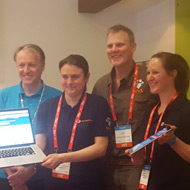New resource launches for vets in the field

Luke Gamble said the website "will become the go to practical tool for vets who might have limited access to resources in field situations".
A new online resource for vets working in developing countries has been launched at BSAVA Congress this week, with the aim of improving animal welfare through education and international collaboration.
Introduced by Luke Gamble at a press conference yesterday, vetinternational.org was developed by the Worldwide Veterinary Service (WVS), BSAVA and the Marchig Animal Welfare Trust.
The site provides easy access to practical guides for vets working in environments where diagnostic facilities and clinical resources may be limited.
Luke Gamble, CEO of WVS and Mission Rabies, said the website "will become the go to practical tool for vets who might have limited access to resources in field situations".
Users of the site have access to fact sheets offering basic practical information, with clear and concise guidelines for diagnosis and treatment. The species sections are broken down into categories comprising medicine, surgery, anaesthesia, shelter management, trap neuter release campaigns and quick reference tools.
A presenting signs option in the medicine section offers information on diagnostic pathways and differential diagnoses of common presenting signs. Safety advice is also provided, for example reminding vets to wear gloves, as drugs can be used in some of these areas without an understanding of the health and safety implications.
To complement the fact sheets, short videos show demonstrations of basic practical skills and surgical procedures. Videos will also show that good practice is very much possible in shelter settings and environments where resources are limited.
Additionally, the site provides concise advice on the practical management of zoonotic diseases, as well as links to further information on the WVS data collection app and BSAVA app.
Luke Gamble added: "I'm certain this site will help a lot of veterinarians around the world in a very practical and brilliant way."



 The latest
The latest